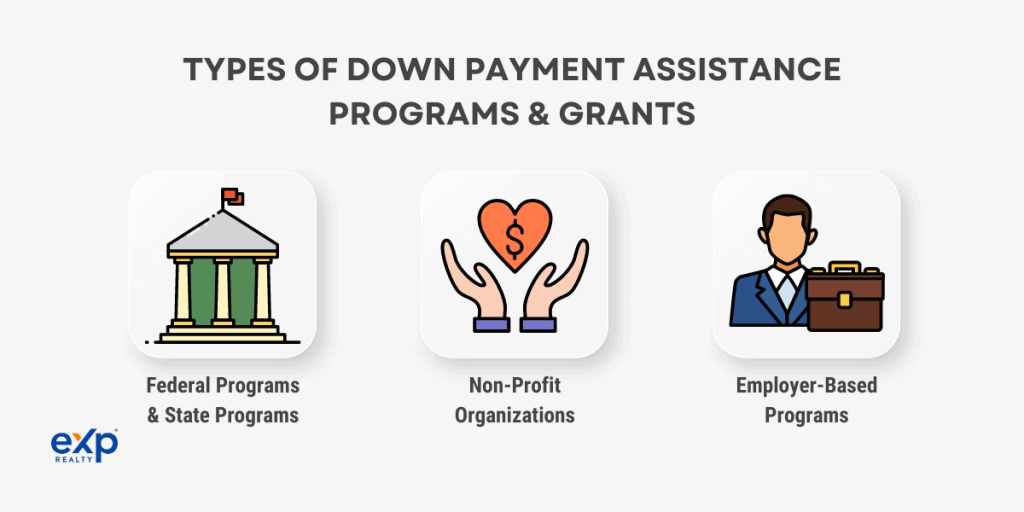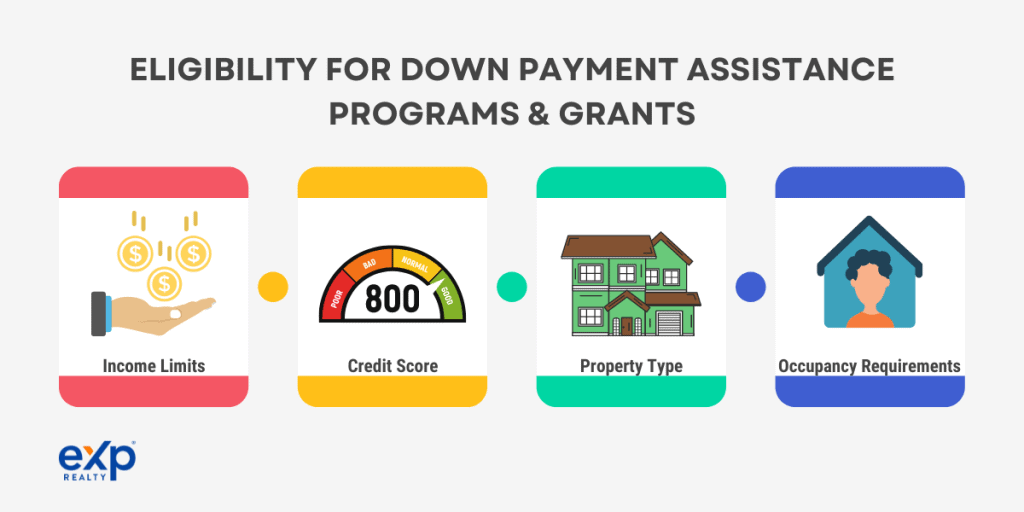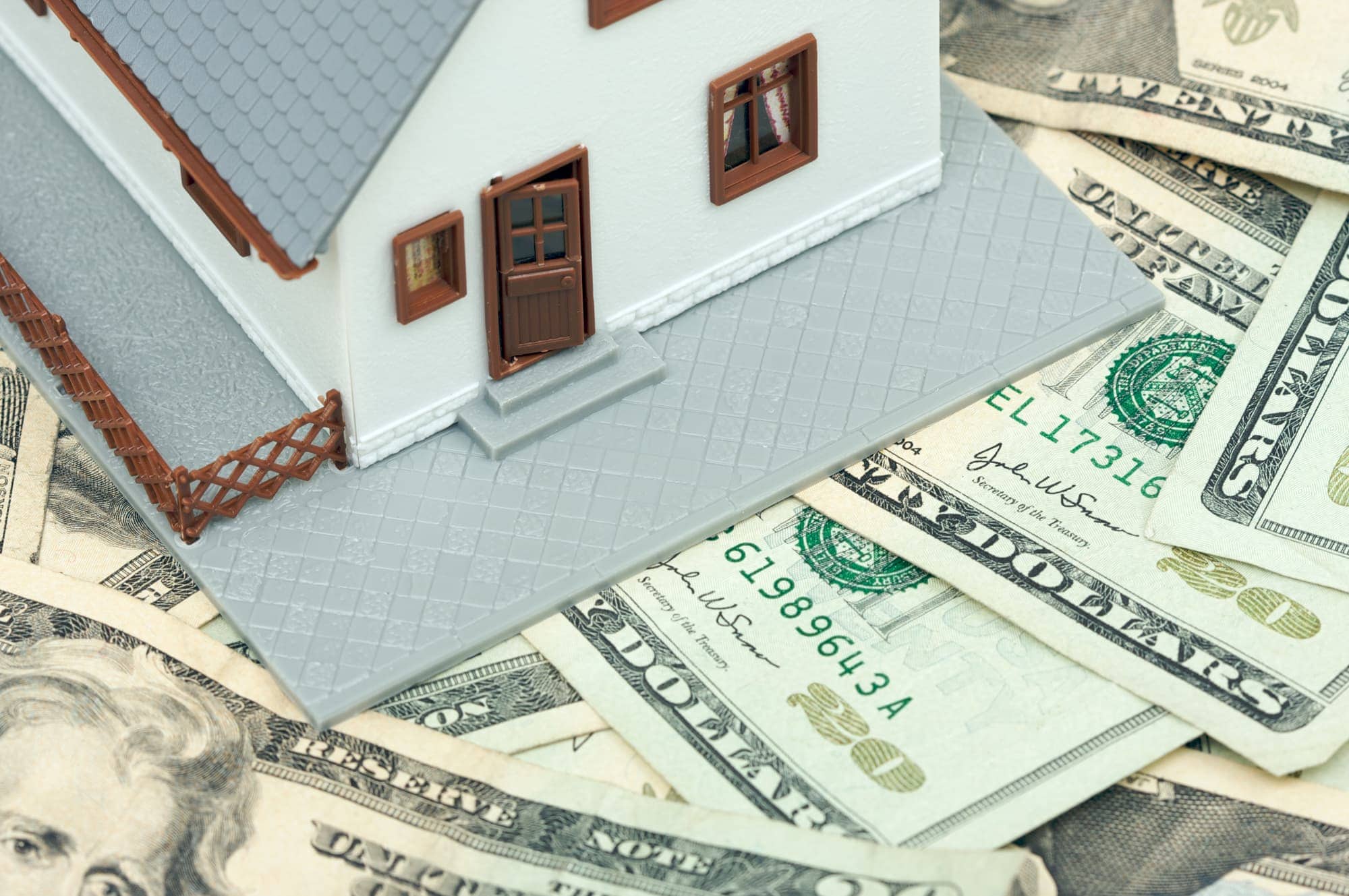Homeownership is an essential part of living the American dream. Owning a home provides shelter for a family and helps build a solid financial foundation. Of course, buying a first home is not without its challenges.
That is why it is crucial to assemble a team of experienced real estate agents like those at eXp Realty. That is, a team that can be an informative and supportive guide through the entire home-buying process.
Before the actual house hunting begins, it is vital to line up the finances for the home purchase. That is where first-time home buyers can take advantage of many down payment assistance programs and grants offered by a variety of government agencies. These programs are all designed with the same goal: Get the keys to a new home into your hands.
Definition of Down Payment Assistance Programs & Grants
Homeownership is a good investment for a family. It’s also a good investment for the economy. Owning a home means paying property taxes that support the local municipality.
It also means making purchases for furniture and appliances, hiring service techs like plumbers, electricians, and gardeners. All of that generates revenue. That is why there are so many state and federal loan programs to help create new homeowners.
When setting up a mortgage loan, there is a down payment. That down payment will be a percentage of your new home’s purchase price. The down payment amount will determine your mortgage’s final cost. It is also a way of proving to lenders that you’re a good investment for them.
Of course, coming up with that down payment takes work for many prospective home buyers. That is especially true when you have to factor in all the other costs associated with buying a home, such as insurance, appraisals, moving expenses, title fees, closing costs, etc.
Accessing a down payment assistance program or cash grant can help those first-time home buyers overcome the down payment hurdle. And many of these grant programs will not have to be paid back. That can make home ownership accessible to many folks currently renting a home or apartment.
Types of Down Payment Assistance Programs & Grants
All options should be on the table when considering down payment assistance programs and grants. Not everyone will qualify for every available down payment program. It only takes one approval for qualified buyers to move the home-buying process forward.

Here are the various types of down payment assistance programs and grants to consider:
Federal Programs
At the top of the down payment assistance programs (DPA) are the programs offered by the federal government. Most of these programs are for first-time homebuyers, such as the Down Payment Toward Equity Act of 2021, which can provide up to $25,000.
Other federal DPA programs specifically benefit teachers, nurses, and first responders. Other programs are strictly for first-generation buyers.
State Programs
Each state has its own down payment assistance programs and grants. These programs encourage home ownership which in turn contributes to the property tax base. These programs vary from state to state and with different eligibility requirements.
Non-Profit Organizations
All across the country, non-profit organizations are dedicated to helping low to moderate-income base families achieve home ownership. These organizations will often partner up with local, state, and federal programs with the goal of making home ownership accessible.
In addition to the down payment assistance, these groups can also help new home buyers with all the other costs associated with moving into a new home.
Employer-Based Programs
Your employer might offer their own version of a down payment assistance program. These programs and grants can supplement a down payment and provide mortgage subsidies.
Typically, you’ll find these types of programs with larger companies that value loyal employees and like to see them rewarded with home ownership.
Eligibility for Down Payment Assistance Programs & Grants
One of the first things prospective first-time home buyers will learn is that this application process involves a lot of paperwork. That paperwork begins with filing the eligibility requirements.

The following are all the factors that go into qualifying for a down payment assistance program or grant:
Income Limits
Income is the first factor for DPA consideration. However, most of these programs have limits on just how much income a recipient can make. The goal is to help families with a median income into becoming homeowners and allowing them to have the budget to purchase a home.
The area median income, or AMI, is the scale applied to applicants to determine if they meet the eligibility requirements. That AMI scale can vary from city to city.
Credit Score
A person’s credit score is another essential eligibility factor for many down payment assistance programs and grants. A high credit score demonstrates a person’s creditworthiness. That means you pay your bills on time and carry only a little debt.
A loan officer will consider a credit score of 620 or higher to be “good.” That is an achievable goal. Boosting your credit score before applying for a DPA is always a good idea.
Property Type
There are many different types of homes that first-time homebuyers can consider for purchase. These types are the following:
- Single-family homes
- Townhouses
- Condominiums
Certain DPA programs are only applicable for a single-family home purchase. The same is for other types of homes. That is why it is important to consider all the options both for the program and the property type.
Occupancy Requirements
Down payment assistance programs and grants want the people who qualify to be the actual occupants of the property. That requires declaring that you intend to utilize the property as your primary residence instead of a rental property investment.
Key Takeaways
It might surprise many prospective first-time homebuyers that these down payment assistance programs and grants are so readily available. But, more importantly, many of these funds can be considered “free money.”
In other words, the fund won’t have to be paid back. And if there are repayment requirements, it will be with very favorable interest rates. The time you invest in researching these programs and grants and talking with your real estate agent will be well spent if it translates into cheaper homeownership.
FAQs
The search for a dream home will raise a lot of questions. So here are a few answers to help you bring your home-buying plans into sharper focus:
How do I get money for a down payment?
The first option for money for a down payment on a mortgage loan is from your own savings. Those savings can also include “gifts” from family members to help increase the down payment amount.
After the savings options, you can look into the many federal and state down payment assistance programs and grants. For instance, the Federal Housing Administration (FHA) accepts applications for loans backed by the U.S. government. These loans are targeted at low to moderate-income families.
Programs are also available to veterans and active duty military personnel to help them buy homes. Additionally, you can check with your local bank. Those institutions also offer down payment assistance for qualified applicants.
What is Biden’s $25,000 Down Payment Toward Equity Act?
The Down Payment Toward Equity Act was a campaign promise offered by President Biden that has already been fulfilled. The goal is to provide financial assistance to increase accessibility for homeownership.
Here’s who is eligible for the funds:
- First-time homebuyers. That is someone who has not owned a home in the past three years.
- First-generation buyers. That would be the first official homeowner in your family.
- People earning 120% or less of the area median income.
- Purchasers that intend to use the property as their primary residence.
What happens if you don’t have enough money for a down payment?
The going rate for a down payment for most mortgage lenders is 20%. However, there are “workarounds” for first-time buyers if you do not have that amount of money. For example, a V.A. or USDA loan requires a 0% down payment.
You might also find an FHA or conventional loan with a downpayment requirement as low as 3%. You can also apply for a downpayment assistance grant. If accepted, that can provide you with the downpayment and closing costs funds.
Can I borrow a loan for a down payment?
Yes, you can get a loan for a down payment. That loan can come from the equity in another property that you own. You can also set up a loan arrangement with family or friends for the down payment funds.
You can also borrow from your retirement funds or set up a personal loan. The caution with taking out low-interest loans for a down payment is that you could end up repaying two loans each month: one for the down payment and one for your mortgage loan. That can put a significant strain on household income.
How to buy a house with no money down in Georgia?
The Georgia Dream Homeownership Program offers affordable mortgage loans for qualified first-time buyers. This program can provide funds for the down payment and closing costs. In addition, it can also set up a low-interest mortgage loan.
The qualifications for this program are similar to many federal down payment assistance programs. Those qualifications are the following:
- You must be a first-time homebuyer.
- You must not have an income level beyond the maximum income level for Georgia.
- You must not have liquid assets of more than $20,000.
- You must meet all mortgage loan credit requirements.
- The purchase price limits for the home can not exceed the per-country limit.
What is the 1st time buyer grant?
A first-time homebuyer grant can provide as much as $10,000 in a cash grant that will go towards the purchase of a home. These grants do not have to be paid back.
Many of these grants are available to qualified applicants through charitable organizations such as the National Homebuyers Fund. There is no limit to how many applications you can put in to qualify for a grant, but you can only accept funds from a single program.
How can I buy a house with a low income?
A person with a low income can still buy a home, but it will mean making some targeted lifestyle changes. For example, with the right loan type, your mortgage payments could be the same amount as you currently pay in rent. That means you can afford to own a home.
You must demonstrate to a lender that you will be a responsible borrower. It begins with boosting your credit score and lowering your debt. That will free up your monthly budget to afford your mortgage loan payments.
How much is a downpayment on a 300k house?
If you were to apply for an FHA loan on a home with a purchase price of $300k you would need a 3.5% down payment. That comes out to around $10,500. That could be the exact amount of down payment funds offered by a grant program for first-time buyers.
How much is a downpayment on a 200k house?
You can use a mortgage calculator to determine the down payment. For instance, a standard down payment for a conventional loan would be 20%. So for a $200K purchase price would be $40,000. That same mortgage calculator will help you budget for a down payment with other types of loans.
In Conclusion
For a clearer idea of which down payment assistance programs you qualify for, ask a local real estate agent for guidance. They will be in the best position to provide you with updated information about the current available DPA programs and grants.
That same real estate agent can also help you search for properties in your budget range. In addition, you can sign up for alerts. That will put you on the inside track to know when a new listing comes onto the market.
When you’re ready to start the home-buying process, contact your local eXp Realty agent. In a competitive housing market, you’ll want that kind of experience in your corner. Choosing the right agency might be the difference that allows you to purchase your future home.





